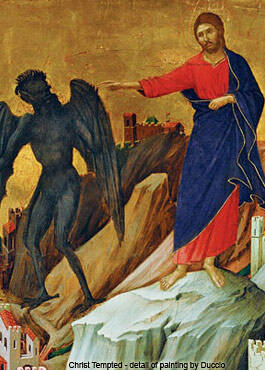The devil does deserve his due. He’s damnably creative. Hard to imagine a better trio of temptations than those he made Jesus. Of course a fasting Messiah wants, and needs, food. Life’s basic necessities make for powerful bargaining chips. And what Messiah, filled with foreboding for the coming mission, wouldn’t leap into arms offering escape? How many of us, knowing what we must do, aren’t sorely seduced by the promise of flight? And Messiahs aren’t alone in being allured by the idea of earth’s realms paying homage to the ego. We’re all tempted to believe that the world revolves around us.
Yes, give the devil his due. He’s never drained of devices. The New Testament has good reason to name him “The Father of Lies” (Jn 8:44). In this century, he’s produced two utterly bogus, but brilliant, claims about our own humanity. Both of them tempt us to forget, or deny, that we are creatures.
The first temptation isn’t new. Half the folk in the bible succumbed to it. It’s to think that we’re utterly unique. There is no realm of earth that, in time, will not be laid bare by our probing intellects. The mind of man stands at the apex of the world. It judges all and is judged by none. There is no God, because we have no room for a deity. In fact, there’s hardly room for a world, we make it so full of ourselves.
The second temptation is quite novel. It doesn’t come from science, though it loves to wear a lab coat as if it did. It’s to believe that there is nothing unique about our humanity. It’s simply the effluvia of evolution. We aren’t creatures who come forth from, and return to, a loving God. We’re nothing more than compounds of chemicals, generations of genetic sequences. So, don’t fret about your use of free will. It doesn’t exist. Forget about sin itself. There is no drama, no clash of good and evil at work in the world. We aren’t responsible to anyone, because we are nothing more than a concatenation of circumstance.
That the two temptations—exaltation and elimination—are completely contradictory little matters. They’re both comfortable claims, and that makes us eager to embrace them. One refuses to recognize what stands beyond us; the other denies what lies within. When we make ourselves the center of the world, there’s nothing left to love, and so we end by denying our own existence as lovers.
In Lent we verse ourselves again in the Gospel, remembering that we are creatures. It’s such an important word, because it evokes that other one, “creator.” To acknowledge ourselves as creatures is recognize that our origin and our destiny lie outside ourselves. The universe doesn’t revolve around us, but neither are we adrift in a bewildering world.
Give the devil his due. What a novel addition to an ancient temptation. First we filled the world with ourselves and now we declare, with regret, that we never were.
Genesis 2: 7-9, 3:1-7 Romans 5: 12-19 Matthew 4: 1-11








